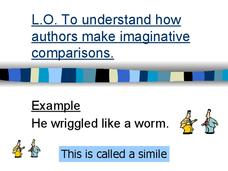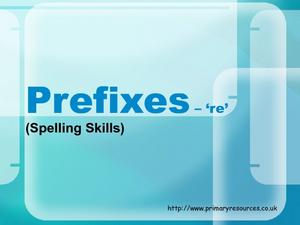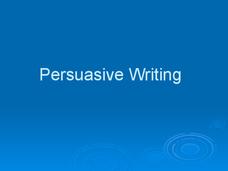E Reading Worksheets
Predictions Reading into the Future
Practice making inferences about fiction with a language arts slide show presentation. After kids read a few tips about ways to predict the next event in a story, they read several passages and try to find out what will happen next based...
Curated OER
Synonyms
Similes and Synonyms are the focus of this language arts presentation. After being introduced to similes and how they work, young writers practice writing similes about the sun by using phrases such as, "The sun is like a golden ring...
Curated OER
State of Being Verbs
Have your class engage in this excellent language arts presentation on verbs. The focus is on the differences between action verbs and state of being verbs. Students choose the state of being verbs on one slide, and move on when they are...
Curated OER
Prefixes
Understanding what prefixes are, why they are used, and how they change the meaning or purpose of words, are the focuses of this language arts presentation. A lot of valuable practice is embedded in each of the 19 slides. Pupils are...
Curated OER
Writing Genres and Rules
A fantastic presentation on writing is here for your students! This could serve a teacher's guideline on what to teach upper-elementary writers. An excellent resource for a teacher of language arts!
Pearson
The Simple Present: Affirmative and Negative Statements
The present tense is a helpful skill to review in any language arts classroom. Focusing on statements made in the affirmative and in the negative, a slideshow presentation guides pupils through grammar rules and examples for the simple...
Curated OER
What I Have Learned: Phonics Review
Providing an exploration of phonics rules, including the use of suffixes, this presentation would be a good tool to use as part of a language arts lesson. The easy-to-understand information on the slides could solidify these concepts in...
Curated OER
Synonyms
Synonyms are very important words in the world of language arts. This PowerPoint serves as a review for those who have been exposed to synonyms. The interactive component of this presentation is quite good. Pupils must choose the correct...
Curated OER
Capital Letters
When and how to use capital letters is the focus of this language arts presentation. The first slide gives the five most common rules for using capital letters. The rest of the slides give young readers lots of practice. Instant feedback...
Curated OER
Compound Words
This 14-slide language arts presentation does a credible job of introducing how compound words work. It gives learners many examples, along with pictures, to practice reading compound words. Nicely-done!
Curated OER
Reciprocal Reading
The strategies associated with Reciprocal Reading are outlined in this language arts presentation. Pupils discover what it means to be the questioner, the summarizer, the predictor, and the clarifier. All four strategies lead to...
Curated OER
The Lion, The Witch, and the Wardrobe - Direct Speech
Direct speech, and the use of quotation marks, are the focus of this language arts presentation. The story, The Lion, The Witch, and The Wardrobe is used to illustrate examples of direct speech and how quotation marks are used. The final...
Curated OER
Spelling - Adding -ing to Verbs
In this language arts presentation, learners are coached on the proper ways, and proper times, to add -ing to a verb. Clear instructions, and engaging examples are embedded in each slide. A very good PowerPoint to use when teaching this...
Pearson
The Simple Past: Yes/No and WH- Questions
Were you in an accident? How did it happen? Pupils practice asking and answering questions with a language arts slideshow presentation. As they work on describing past events to explain a current condition, individuals take a look...
Curated OER
Let's Learn Library Language
This PowerPoint presentation provides a review of 'library language', vocabulary associated with books and the library such as cover, title, author, illustrator, call number and fiction/nonfiction. Each slide of this PowerPoint displays...
Curated OER
What is a Noun? & When To Capitalize Nouns
Nouns are the focus of this language arts PowerPoint. Pupils will see that there are five categories of nouns: person, place, thing, idea, quality. The last two are not usually taught, but they are legitimate categories. When to...
Estrella Mountain Community College
Active and Passive Voice
Adult language learners will benefit from this 20-slide presentation about active and passive voice constructions. Learners craft active and passive voice questions in the simple present and simple past tenses.
Curated OER
Sentences and Non-Sentences
Use the popular theme of sharks to discuss complete sentences and sentence fragments with your language arts class. This is a great, interactive exercise to get all of your learners involved. Consider pairing kids up in teams to create...
Curated OER
Tongue Twisters
Young readers practice their letter sounds by engaging with this language arts PowerPoint. Six letters are used: p, l, s, w, c, and d. Pupils learn tongue twisters for each letter such as: "Wiggly worm wiggles in the water." Very nice!
Curated OER
Writing a Story - How do I Start?
Terrific tips on how to start a story is the focus of this language arts presentation. Tips include: describing what's about to happen in the story, examples of sentence openers, and how to capture a reader's attention right away. There...
Curated OER
Prefixes -"re"
The prefix, re- is the star of this basic language arts presentation. Learners are introduced to the prefix by reading a variety of words that use it. They discover that it means to do something again. As the PowerPoint goes on, learners...
Curated OER
Sight Words
Forty-five different words are listed in this vibrant PowerPoint. Review this presentation daily to kick-off your language arts lessons. Each word is presented on its own slide against a colorful background.
Curated OER
Persuasive Writing
Prior to assigning your class their own persuasive writing task, present this PowerPoint and complete the task as a whole class. It outlines characteristics of persuasive writing, as well as includes a great learning activity. Your class...
Curated OER
My Monster
Explore descriptive language. Learners read a series of similes describing the eyes, teeth, skin, and other features of a monster. Then, they describe their own imaginary monster using similes and adjectives. Very creative!
Other popular searches
- 5th Grade Language Arts
- 3rd Grade Language Arts
- 4th Grade Language Arts
- Second Grade Language Arts
- English Language Arts
- 1st Grade Language Arts
- Kindergarten Language Arts
- Language Arts Jeopardy Game
- First Grade Language Arts
- Language Arts School Projects
- Language Arts Lesson Plans
- Language Arts Games

























